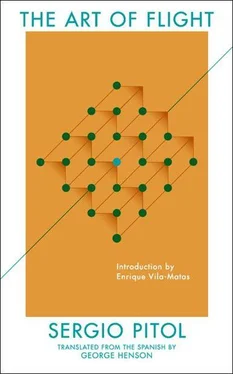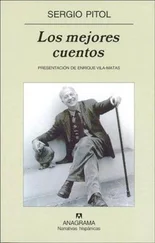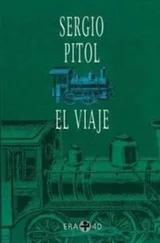Sergio Pitol - The Art of Flight
Здесь есть возможность читать онлайн «Sergio Pitol - The Art of Flight» весь текст электронной книги совершенно бесплатно (целиком полную версию без сокращений). В некоторых случаях можно слушать аудио, скачать через торрент в формате fb2 и присутствует краткое содержание. Год выпуска: 2015, Издательство: Deep Vellum, Жанр: Современная проза, на английском языке. Описание произведения, (предисловие) а так же отзывы посетителей доступны на портале библиотеки ЛибКат.
- Название:The Art of Flight
- Автор:
- Издательство:Deep Vellum
- Жанр:
- Год:2015
- ISBN:нет данных
- Рейтинг книги:5 / 5. Голосов: 1
-
Избранное:Добавить в избранное
- Отзывы:
-
Ваша оценка:
- 100
- 1
- 2
- 3
- 4
- 5
The Art of Flight: краткое содержание, описание и аннотация
Предлагаем к чтению аннотацию, описание, краткое содержание или предисловие (зависит от того, что написал сам автор книги «The Art of Flight»). Если вы не нашли необходимую информацию о книге — напишите в комментариях, мы постараемся отыскать её.
The first work in Pitol's "Trilogy of Memory," The Art of Flight imaginatively blends the genres of fiction and memoir in a Borgesian swirl of contemplation and mystery, expanding our understanding and appreciation of what literature can be and what it can do.
The Art of Flight — читать онлайн бесплатно полную книгу (весь текст) целиком
Ниже представлен текст книги, разбитый по страницам. Система сохранения места последней прочитанной страницы, позволяет с удобством читать онлайн бесплатно книгу «The Art of Flight», без необходимости каждый раз заново искать на чём Вы остановились. Поставьте закладку, и сможете в любой момент перейти на страницу, на которой закончили чтение.
Интервал:
Закладка:
I lived in Warsaw from 1963 to 1966, a surprising period in many ways. A few years earlier, in 1956 in Moscow, during the famous 20 thCongress of the Communist Party, an incredible document was read condemning Stalin’s crimes, which in Poland translated into a spring that lasted several years. Beginning in 1957, censorship began to yield ground; Witold Gombrowicz’s novels were able to be published, as well as “difficult” works by authors from within, the aforementioned novels by Andrzejewski, and Kazimierz Brandys’s Mother of the Kings , Leszek Kolakowski’s The Key to Heaven , and Shakespeare Our Contemporary by Jan Kott, which would have caused serious problems for the author had it circulated a few years earlier. During that time, a prewar avant-garde repertoire reappeared in the theater, especially Witkiewicz’s dramas of the grotesque; the contemporary works by Slawomir Mrozek also premiered. Bruno Schulz’s work was published again, and included in the index of socialist realism. There was a lot of experimentalism and energy in the theater, cinema, music, and, to a certain extent, in literature. Before I left Poland, the situation was beginning to change — for the worse, of course, and the spaces that had been gained were gradually closed.
Shortly after I settled in Warsaw, I received a copy of an Italian translation of The Inquisitors . I read it immediately. It seemed unimaginable that in an Eastern European country something like it could be published. The story was set in fifteenth-century Spain, the central character was Torquemada, and the setting was the tribunals of the Holy Inquisition. There was something shocking about reading that book at that time. Its similarity to the mechanisms, to the methods, and even to the language of the repressive organs of the immediate past was astounding. A theatrical version, directed by Andrzejewski himself, attracted crowds that remained in the theater, breathless, as if they were attending a mystical session or an exorcism. The Poles recognized the cruelty of the times they had endured — the destitution, the unscrupulousness, the surveillance, and the inhuman punishments — everything attenuated by the belief that the end justifies any kind of means. And that end was sublime, delusional, and redemptive: the establishment of the Kingdom of God on Earth, no less! The audience recognized its executioners in the play, they heard a language similar to one they had been subjected to, but at the same time they were obligated to recognize the personal role they had played in one way or another in the cruel masquerade. It was obviously the work of a moralist; the theatrical version had the steely character found in the morality plays of English medieval drama used to reinforce catechization, not unlike Spain’s autos sacramentales . The difference between The Inquisitors and its contemporaries, the moralizing and didactic works of socialist realism, was vast; Andrzejewski’s literary mastery was undeniable, thanks to which the abstract character that the subject demanded did not come off as hollow sermonizing. The reader and viewer received the balm they needed because, despite the discursive tone, a feeling of mercy emanated from the work, not only toward the offended and humiliated but also and especially toward men who in their youth had joined, with passion and absolute faith, a cause in which they believed, only to discover years later that instead of serving God they had become followers of the devil. Their lives shattered suddenly into bits of ash and rubble. Their commitment and zeal had only served the forces of evil. As they lost their faith they also saw themselves stripped of all dignity and self-respect, yet they refused to allow society to treat them like dung.
Around that time, I read Ryszard Matuszewski’s Profiles of Contemporary Polish Artists to familiarize myself with contemporary Polish literature; a purely informative book, not dogmatic, but yes, as far as I remember, too cautious — one of those phlegmatic literary panoramas, a bit bland and sparing in terms of ideas — but decidedly useful. I searched for Andrzejewski’s biographical sketch. Matuszewski profiled the young Catholic pre-war intellectual and follower of Jacques Maritain; he spoke of the success of his first novel, Mode of the Heart , of the presence in the work of echoes of Joseph Conrad and two French Catholic writers, François Mauriac and Georges Bernanos. He also spoke of Andrzejewski’s activity in the resistance during the period of occupation, of his distancing from the right-wing groups he had frequented in the past, until arriving at the discovery, once Poland was liberated, of a devastated, amorphous, and lost, but at the same time hopeful, society, which he described in his first major novel, Ashes and Diamonds (1948), in which he treated with evenhandedness the men of the new regime as well as the desperate youth who shed their blood and others’ on the altar of a dead Poland, of exhausted values, of the former marshals. Matuszewski referred to Andrzejewski as a new type of Polish writer: a moralist. The profile ended there; it did not treat the novelist’s new works: The Inquisitors and The Gate of Paradise ; I do not know, nor do I now have means to verify, if it was because the Profiles were published before the appearance of those novels, or if out of caution, or fear of unpleasant consequences, he might have preferred not to comment on those books that seemed to give off a strong odor of sulfur.
So when I arrived in Poland Andrzejewski’s celebrity had already been established. To his enthusiasts he represented the moral consciousness of the nation, a lone voice in the midst of a multitude of opportunists, of triflers or imbeciles, and during the years I lived in the country I was witness to infinite, never-ending, and violent arguments about his personality, his opinions, and his life. Filmmakers, young writers, and university students all revered him. The dogmatists, people of reason, those on the left as well as the right, condemned him. The former were proud of his clarity, his literary talent, his consistency, and, above all, his courage — a superlative quality in Poland; the latter, the representatives of order, Catholics or Communists, abhorred him. He was the worst possible example for Polish youth; the sordidness of his life, the places and people he frequented would have — they argued — led him many years before, in a truly respectable country, to prison. That this arrogant pervert — friend of Jews, perhaps Jewish himself by some branch of the family — dared speak about public morality made them tremble with rage. I lived for a long period of time at the Hotel Bristol in the center of Warsaw where there was a small café-bar whose atmosphere could be dazzling. There I was able to see up close Marlene Dietrich, Jacques Brel, Peter Brook, Arthur Rubinstein, Claudio Arrau, Giorgio Strehler, Ella Fitzgerald, and Luchino Visconti. These colorful and illustrious guests stayed in the Bristol when they came to Warsaw; the locale was also frequented by Polish writers and artists. They would have had to chain me in my room to stop me from showing up there every evening. On several occasions, I saw Andrzejewski in conversation with Andrzej Wajda, the director who had adapted his novel Ashes and Diamonds into an extraordinary film. They were working, it seemed, on a new script; they read, drank vodka, and argued endlessly. Eventually, they were joined by so many famous actresses and actors that their table became the café’s center of attention.
I do not recall who introduced us, but I do remember at our first meeting he spoke specifically of Dostoevsky’s Crime and Punishment . He said, dismissively and shrugging his shoulders, that the Poles would never be able to understand Dostoevsky. They tried to approach him from only a religious perspective. They had turned Romano Guardini’s book into a primer from which they were afraid to stray. Reading Dostoevsky was for them a form of prayer. “If someone were to tell them that what was truly important was to pay attention to the struggle in any of its chapters between instinct and reason and the feeling of victory and defeat that the contenders shared after the fight, my countrymen would be dumbfounded, because that’s not how it is written in their prayer book. All they care about is that, you know, prayer — not just the Catholics, the Communists too,” and he shrugged his shoulders again as if trying to rid himself of a heavy burden, while the shadow of a flash of lightning passed through his eyes. On another occasion, I heard him comment that of the Hispano-American authors translated into Polish, which were then still very few, the only one that interested him was Carpentier. Not The Lost Steps , he clarified, where the opulence of language and the masterful architecture was wasted on an insignificant topic: the futile search for the sources of creation and the attempt to find them in their most primitive veins — the forest — as opposed to the elements developed over centuries by thought. Stravinsky had already done that at the beginning of the century. The opposition seemed obsolete to him. “Only the most primitive Polish nationalists could hold such nonsense. For them folklore is the greatest gift that mankind has received from the gods.” Explosion in the Cathedral was another matter. “Anyone who lived through the German occupation and the hardest chapter of the totalitarian state could read that book as if the story of betrayed ideals were part of his own experience. When I got to the last paragraph I returned to the beginning to reread that exceptional book.” He declared that in literature he only appreciated real challenges and the search for great form, and that in Poland novelists had become so lazy and demoralized that nobody dared to undertake such an ambitious effort as Carpentier had in that book. Someone mentioned then a recent novel by Jarosław Iwaszkiewicz, and asked with feigned innocence if it was not perhaps the equivalent he was looking for. Andrzejewski again shrugged his shoulders, cast a burning look, smiled sarcastically, and said something in slang that I did not understand but that provoked a perverse laugh from all those present.
Читать дальшеИнтервал:
Закладка:
Похожие книги на «The Art of Flight»
Представляем Вашему вниманию похожие книги на «The Art of Flight» списком для выбора. Мы отобрали схожую по названию и смыслу литературу в надежде предоставить читателям больше вариантов отыскать новые, интересные, ещё непрочитанные произведения.
Обсуждение, отзывы о книге «The Art of Flight» и просто собственные мнения читателей. Оставьте ваши комментарии, напишите, что Вы думаете о произведении, его смысле или главных героях. Укажите что конкретно понравилось, а что нет, и почему Вы так считаете.












